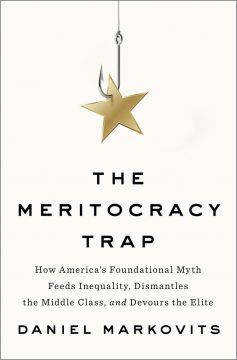Sarah Leonard in The New Republic:
 In 1958, sociologist Michael Young wrote a dark satire called The Rise of the Meritocracy. The term “meritocracy” was Young’s own coining, and he chose it to denote a new aristocracy based on expertise and test-taking instead of breeding and titles. In Young’s book, set in 2034, Britain is forced to evolve by international economic competition. The elevation of IQ over birth first serves as a democratizing force championed by socialists, but ultimately results in a rigid caste system. The state uses universal testing to identify and elevate meritocrats, leaving most of England’s citizens poor and demoralized, without even a legitimate grievance, since, after all, who could argue that the wise should not rule? Eventually, a populist movement emerges. The story ends in bloody revolt and the assassination of the fictional author before he can review his page proofs.
In 1958, sociologist Michael Young wrote a dark satire called The Rise of the Meritocracy. The term “meritocracy” was Young’s own coining, and he chose it to denote a new aristocracy based on expertise and test-taking instead of breeding and titles. In Young’s book, set in 2034, Britain is forced to evolve by international economic competition. The elevation of IQ over birth first serves as a democratizing force championed by socialists, but ultimately results in a rigid caste system. The state uses universal testing to identify and elevate meritocrats, leaving most of England’s citizens poor and demoralized, without even a legitimate grievance, since, after all, who could argue that the wise should not rule? Eventually, a populist movement emerges. The story ends in bloody revolt and the assassination of the fictional author before he can review his page proofs.
In 2001, Young would take to The Guardian to declare his disappointment that Tony Blair, alongside politicians in the United States, had adopted the term without irony. The New Labour government now talked of “breaking down the barriers to success” and declared that “the Britain of the elite is over. The new Britain is a meritocracy.” Blair’s Cabinet, like George W. Bush’s and then Obama’s, was packed with graduates of the most elite educational institutions in the world. Young’s vision of IQ testing may have been a little off, but elite education had become the prerequisite for power. “It is good sense to appoint individual people to jobs on their merit,” Young wrote. “It is the opposite when those who are judged to have merit of a particular kind harden into a new social class without room in it for others.”
Sixty years on from Young’s book, a pure product of meritocratic training has emerged to write what he hopes will be the epitaph for his class.
More here.
